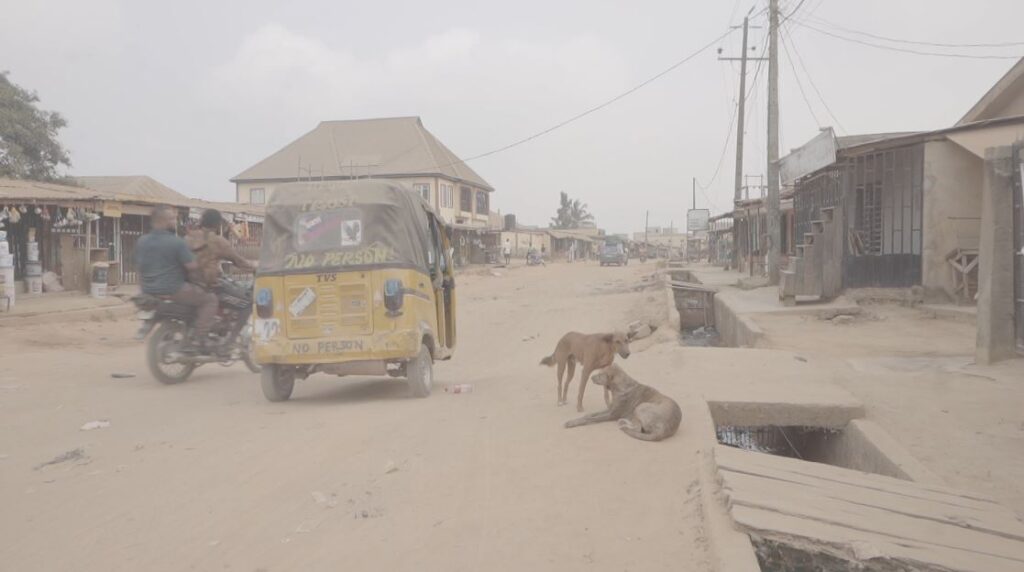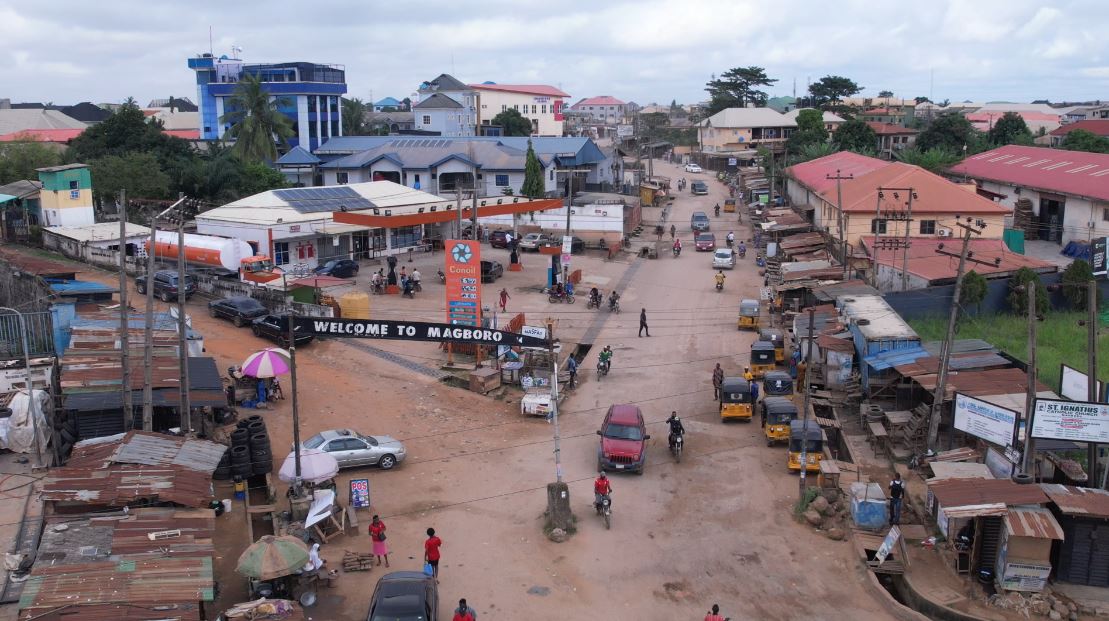At dawn, the roads leading out of Magboro come alive – vehicle horns blaring, motorcycles speeding through rough roads, and weary commuters bracing for another long journey into Lagos. For many, this daily grind is the price of a quieter, more affordable life outside the metropolis.
Geographically, Magboro lies on the almost indistinguishable border between Ogun and Lagos States. However, rapid urbanisation has blurred the lines, bringing it within the precincts of what some might call greater Lagos.
Once a sleepy town in the Obafemi Owode Local Government Area of Ogun State, Magboro has rapidly transformed into a haven for those seeking relief from the chaos of Lagos – while remaining within reach of its opportunities.
But despite its appeal, the community grapples with poor road networks and unreliable power supply, daily struggles that test the resilience of its residents.
It was on my second trip there that I truly understood the phrase ‘survival of the fittest.’ The roads were a maze of potholes – the next deeper than the last. During the rainy season, one must contend with a muddy, slippery terrain, and in the dry season, clouds of dust settle on everything in sight.
In 2014, Mrs. Efe Ugbine and her family embraced this trade-off when they moved to Makogi, a community in Magboro, about 12 kilometers from Lagos. They were overjoyed to finally have their own home, but their jobs in Lagos meant the city never truly let them go.
“We would always remove our (car’s) bumper and carry it in the boot, because there used to be one big ditch that could almost swallow our whole car,” Mrs. Ugbine said, describing the poor state of the roads when they moved. On days when it rained, the family only stepped out for essentials, or emergency needs such as health issues.

“Sometimes when it rains,” she said, “the school bus wouldn’t come,” forcing parents to make the journey themselves. A trip that should take 10 minutes often stretched to an hour.
Due to the transport challenges, some families relocated from Magboro but the Ugbines felt they had few options, as they had just built a house in the community. They started a business selling provisions and household essentials. However, sustaining the business came with its own difficulties – from logistics to convincing customers that higher prices were justified.
“People would say, ‘This thing is cheaper in Lagos,” Mrs. Ugbine told me. “I’d tell them, ‘Getting goods into this community is not easy, you should even praise us.”
‘A good area’
Mr. Hamzat Jelili visited Magboro for the first time in 2005. At the time, Magboro was a largely undeveloped and unmotorable area, dominated by forests and trees. Undeterred, Mr. Hamzat decided to settle in Magboro in 2006. Convinced that the town offered a promising future, he and his wife purchased half a plot of land on which they built their family home.
“We had to park far away and walk down with our load on our heads because there was no road,” he said.
Despite the early difficulties, they soon settled into their new life in Ajegunle – another community in Magboro. The prospect of owning a home in a peaceful and secure environment was his primary motivation.
“Magboro is a good area,” he said. “There are no touts, no violence, and everything is going smoothly.”
Mr. Hamzat spent years working in Lagos as both a transporter and a housing agent. But life slowed down when he had a partial stroke and, shortly after, lost his wife who was his major support system. Left to cater for his three young children, while gradually recovering from the stroke, he focused on real estate, helping aspiring home-owners secure land in Magboro.
“Back then, you could get half a plot of land for about ₦100,000, and a full plot for between ₦150,000 and ₦180,000,” Mr. Hamzat said. Today, the price for the same piece of land has soared to ₦12 million, with full plots starting at a whopping ₦20 million, depending on the location.
The increase in property value underscores the rapid urban expansion the town has experienced over the years. Yet, key infrastructure has lagged behind. Despite past government promises, the majority of Magboro’s development has come from either community efforts or private actors.
A promise revisited
In August 2024, Ogun State Governor, Dapo Abiodun announced plans for the reconstruction of the 8.17km Magboro-Makogi road and underpass. This declaration, made during his visit to the Magboro Rice Farm, offered a glimmer of hope to residents. However, the lack of visible progress in the following months fueled skepticism.
Unable to secure a meeting with the Community Development Association’s (CDA) spokesperson, I decided to attend a CDA general meeting on January 18. There, the Magboro Area Community Development Committee (MACDC) chairman, Alhaji Akeem Owolabi, reassured residents that the promised reconstruction was on track. “We have seen the signs,” he said. “They (the China Civil Engineering Construction Corporation) are around now and will start work fully by the first week of February.”
With an estimated duration of six months, the project appears to be underway, as trucks and construction equipment have been stationed at the community entrance.
However, beyond the state of its roads, Magboro faces another significant hurdle: unreliable electricity supply.
Community in darkness
Until 2016, Magboro had endured a decade of total black-out. The restoration of power on December 25, 2016, was a moment of profound celebration, a true Christmas miracle.
But again, the joy was short-lived. According to Mrs. Ugbine, it wasn’t until 2017 that electricity supply stabilised a little. “Sometimes, the light comes for one day and disappears for the next three days,” she said. “It was really hell.”
She recalled running a generator for long periods to keep her shop operational. At the time,“we even bought bundles of wire to connect power from the house to the shop,” Mrs. Ugbine said.
The nearest filling station was also far away so, on days when she could not get fuel to power the generator, the shop stayed shut.
Despite the erratic power situation – now rationed between day and night – residents like Mr. Hamzat, who have endured years of complete blackouts, take an optimistic view.
“Half bread is better than none,” Mr. Hamzat told me, pointing to the “many positive changes” that have taken place over the years.
These changes, according to him, include the establishment of a police station and health center, thanks to the efforts of the former CDC Chairman, Rotimi Afolabi.
This sense of optimism aligns with the very meaning of ‘Magboro,’ which locals say translates to “expand” or “spread out.”
However, for newer residents like Mrs. Rachael Choko, life in Magboro remains challenging. Seeking a fresh start and a change of environment, she moved to the area in 2023.
While she describes Makogi as “peaceful” and the people as “accommodating,” her transition has been far from easy.
A single parent, with three children to care for and mounting bills, she juggles two jobs: event planning and catering.
The poor condition of the roads has a significant impact on her daily life, particularly when it comes to keeping appointments. A 6am call time, for example, means starting her day well before dawn.
For those without private vehicles, motorcycles (okada) or tricycles (keke maruwa) are the only options, but even these can be unreliable depending on the time and location.
“Before you even move out of Makogi to Magboro, it’s terrible,” she said, explaining that the numerous bumps not only lengthen her commute but also leave her exhausted.
Like the roads, unreliable electricity poses a major challenge for Mrs. Choko’s catering business. “When I expect power to keep my freezer cool during preparations, it’s not there, sometimes for days. It is frustrating,” she said.
Compared to other areas in Lagos with relatively near-constant electricity, she said even just eight consistent hours would make a world of difference.
Generators and solar-powered inverters are now a common sight in the rapidly expanding town. However, these alternatives don’t come cheap.
The lack of adequate power supply raises questions about the role of the Ibadan Electricity Distribution Company (IBEDC), which is responsible for electricity distribution in Magboro. Challenges with meter allocation and transformer procurement compound the power problem.
As the population grows, increasing power demand places a significant burden on existing transformers, a responsibility that eventually falls on the community.
During the January 18 CDA meeting, a member of the executive committee said, “If we want to sustain these transformers, we’ll have to relieve them because of the load demand.” Obtaining a new transformer requires at least N16 million.
Despite attempts to obtain an official comment for this story, IBEDC remained unresponsive. However, the company has announced a long-term, ₦180bn Power Purchase Agreement with Bresson A S Nigeria Limited and the Magboro Power Company. The agreement announced in October 2024, aims to provide 24-hour uninterrupted power within 11 months.
“The Magboro plant, designed as a 90 MW plant, is expected to receive its first shipment of Titan 170 Solar Turbines by the end of April 2025,” the IBEDC said in a statement.
Although the prospect of 24-hour electricity feels ambitious, the project offers a sliver of hope for the Magboro community’s struggle for reliable power.
As residents wait with bated breath, they continue to adapt and thrive, holding on to the belief that this land, true to its name – will flourish.
Having endured the challenges for 10 years, Mrs. Ugbine is optimistic that “by the time we have good roads and light, the sky will be our stepping stone.”
This story was supported by a grant from the Ikeja Record Community Awards
